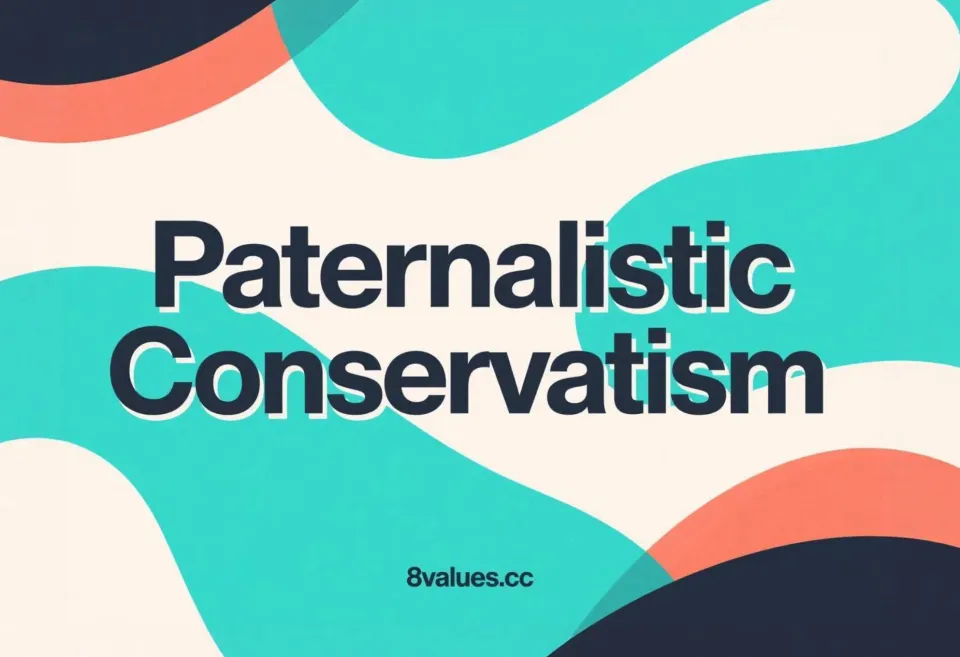An in-depth interpretation of the political trend of Paternalistic Conservatism
In-depth analysis of Paternalistic Conservatism, an important branch of conservatism, to understand its origins, core principles (such as noblesse oblige, organic social theory) and its role in maintaining social stability and welfare policies, as well as how it balances tradition and change.
Paternalistic Conservatism is a unique conservative trend that combines traditional values with the concept of state intervention to ensure the well-being and stability of members of society. This ideology emphasizes that the social elite or authoritative class should take the initiative to protect and guide the people like "parents".
When exploring your political stance, it's important to understand what different ideologies actually mean. You can assess your leanings by visiting the Political Values Ideology Test at 8Values Quiz , but before that, let’s dive into what paternalistic conservatism is all about.
The definition and ideological roots of Paternalistic Conservatism
Paternalistic conservatism is a branch of conservatism that reflects the belief that society exists and develops organically and that its members have mutual obligations to one another.
The origins of the ideology can be traced to the Industrial Revolution in the 19th century, when industrialization and urbanization increased social unrest, poor working conditions, and inequality between rich and poor. Paternalistic conservatism emerged as a response to these social and economic upheavals.
The core characteristics and positioning of paternalistic conservatism:
- Paternalistic Care At the heart of paternalistic conservatism is care and concern for those who cannot help themselves, a relationship similar to that between a father and his children.
- A product of traditional conservatism It is consistent with the principles of duty, hierarchy, and organic unity, and is therefore seen as an extension of traditional conservatism.
- Neutral Pragmatic Position Paternalistic conservatism is neither pro-individual nor pro-state in principle. They support or recommend a balance between the individual and the state, depending on what is most practical.
- Maintaining Stability This is the idea that authority, if exercised responsibly, can be a force for good, guiding society toward stability and welfare. The protective role of authority helps maintain social stability and promotes well-being.
Core Principles: Aristocratic Obligation, Hierarchy and an Organic View of Society
The core principles of paternalistic conservatism are the key to distinguishing it from extreme laissez-faire and radical socialism.
Aristocratic Obligation and Class Reconciliation
"Noblesse oblige" is a concept at the heart of paternalistic conservatism, derived from the concept of feudal society in which those who enjoyed privilege and wealth had responsibilities and obligations to the poorer parts of society.
- The Price of Duty This is the idea that having responsibilities is the price of privilege. Therefore, the ruling class or upper class has a moral responsibility to take positive steps to improve the living conditions of the less privileged groups.
- Top-down reform This message is rooted in the principles of responsibility and social obligation in ideas such as “noblesse oblige,” which aims to achieve social cohesion and solidarity. Paternalistic conservatism believes that "reform from above" is better than "revolution from below." As British Prime Minister Benjamin Disraeli said: "The palace is not safe when the cottage is not happy" (the palace is not safe when the cottage is not happy), which shows that helping the lower classes is also a pragmatic strategy to maintain social hierarchy and stability.
Organic Social Theory and the Imperfection of Human Nature
Paternalistic conservatism views society as an organism that develops naturally and cannot be artificially designed or programmed. Society is more like a plant than a machine, and change must be a gradual, natural, and evolutionary process.
- Hierarchy and Authority In organic societies, hierarchical structures are seen as natural and necessary to maintain order and stability. Authority plays a guiding and protective role in society. Paternalistic conservatives tend to support a “fiduciary model” of governance, in which elected officials use their judgment to act in the best interests of society rather than simply following popular opinion.
- Human Imperfection One of the cores of this thought is the conservative principle of human imperfection. They believe that humans are fallible and limited, and may not always make the best choices for themselves. Therefore, authoritative guidance and support are necessary.
If you would like to know whether you are more left-wing or right-wing in social and economic areas, you can take the RightValues Political Spectrum Test and the LeftValues Political Values Test .
Historical Practice: One-State Conservatism and Bismarck’s Welfare State
Paternalistic conservatism is mainly reflected in One-Nation Conservatism and Christian Democracy in continental Europe.
Britain: Disraeli’s Conservatism in One Nation
Benjamin Disraeli is widely regarded as the founder of One Nation Conservatism.
- Warning of the 'Two Nations' In his novel Sybil, Or The Two Nations, Disraeli laid out his political philosophy, fearing that industrialization and growing inequality would lead to the division of Britain into "haves" and "have-nots".
- Policy Practice To address these effects, Disraeli promoted social reforms, including policies aimed at improving the living conditions of the working class. His government enacted the Public Health Act of 1875 and the Factory Act, which improved public health and sanitation in towns and cities and shortened working hours for women and children.
- Pragmatic balance This approach is the embodiment of conservatism’s “change in order to be conservative” . Conservatives recognized that in order to preserve the essence of tradition and social class, careful, incremental reforms were sometimes necessary to avoid more radical social unrest.
In post-World War II Britain, one-nation conservatives such as Winston Churchill and Harold Macmillan continued this tradition by accepting and managing the mixed economy and welfare state that emerged after the war, arguing that undoing these measures would threaten social stability and hierarchy.
Germany: Bismarck’s National Socialism
In 19th-century Germany, paternalistic conservatism emerged in a hardline form. Otto von Bismarck established the world's first modern welfare state.
- Purpose of State Intervention Bismarck implemented a series of state-organized compulsory insurance policies for workers, including sickness, accident, disability and old-age insurance. These reforms were called part of the "state socialist" program.
- A Strategy to Weaken Opponents Bismarck's aim was to undermine the appeal of the socialist movement by gaining support from the working class, thereby preserving the German monarchy and traditional order. This approach is a good example of a combination of conservatism’s maintenance of order and paternalistic intervention to protect workers’ rights.
Paternalistic Conservatism’s Economic Policies and State Intervention
The economic stance of paternalistic conservatism is significantly different from both laissez-faire capitalism (Laissez-faire Capitalism) and a thoroughly planned economy (Command Economy).
Economic stance: social market versus limited intervention
Paternalistic conservatism supports the role of government in fairly broad state intervention to help all citizens live a good life.
- Opposing extreme liberalism Paternalistic conservatism criticizes that unfettered free markets will lead to social injustice and moral decay, and rejects the "market omnipotence theory."
- Support mixed economy They economically support the market-driven Social Market Economy or mixed economic model, and advocate taking into account social welfare strategies in free competition.
- Social Safety Nets Emphasize the importance of social safety nets in combating poverty, supporting the redistribution of wealth, and government regulation of markets in the interests of consumers and producers. This includes supporting policies such as tariffs that improve labor conditions, limit child labor, and protect domestic industry.
However, despite accepting state intervention, paternalistic conservatives do not support anything resembling a command economy or a planned economy .
Moral paternalism and soft intervention
In addition to economic intervention, paternalistic conservatism also involves moral paternalism .
- Moral guidance Moral paternalism advocates that the government should guide individuals to make morally and socially responsible choices while respecting individual freedoms. Government recognition of certain values and norms is essential to maintaining social stability.
- Soft paternalism Concepts such as soft paternalism and libertarian paternalism have emerged in modern policy, which aim to "nudge" individuals to make better decisions without restricting their choices, such as voluntary opt-out of organ donation programs or laws mandating the wearing of seat belts.
You can learn more about political ideology and public policy through our official blog .
The opposition between paternalistic conservatism and the New Right and contemporary controversies
Paternalistic conservatism has historically been the dominant theoretical perspective within the conservative party, but in the late 20th century, it was strongly challenged by the New Right.
The Rise of the New Right and the Rejection of Paternalism
The election of Margaret Thatcher in 1979 marked the "abrupt end" of British paternalistic conservatism.
- Ideological Conflict The New Right, with its neoliberalism political orientation, rejects many of the ideals of paternalistic conservatism. The New Right emphasizes individualism , laissez-faire economics , and minimal state intervention , believing that individuals have the responsibility to care for themselves and their families.
- Criticism of the Welfare System Representatives of the New Right such as Ayn Rand opposed the welfare state, believing that it violated individual freedoms and created unhealthy dependence among recipients. They believe that excessive state intervention in the economy not only infringes on individual freedoms, but also hinders economic growth and innovation.
- Contemporary Trends Although the New Right dominated conservatism at the end of the 20th century, the idea of paternalistic conservatism retains its contemporary importance. For example, Europe's Christian Democrats continue to emphasize social market economies and traditional values.
Criticism and boundaries for parents
Paternalistic conservatism faces some inherent criticisms and challenges in modern society:
- Concentration of power and dependence Critics believe that it is a kind of " granted " rule that may reinforce class dependence rather than true equal rights. It assumes that elites have the ability and willingness to work for the good of society, but elites may sometimes prioritize their own interests.
- Restrictions on freedom Paternalism may be criticized as treating adults as children and may hinder the growth of individuals and make them dependent on the state. Excessive “care” may deprive individuals of their autonomy, for example by limiting personal choices in the name of morality or tradition.
- Cultural conflict: There is a conflict between paternalistic conservatism’s advocacy of maintaining traditional social structures and the growing multiculturalism of modern society (such as LGBTQ+ rights, immigrant culture), which may lead to cultural conflicts.
Paternalistic conservatism is a unique political philosophy that seeks a balance between maintaining tradition, authority and social care by emphasizing "warm conservatism." If you'd like an in-depth test to determine exactly where you fall on the ideological spectrum, try popular politics tests like our 9 axes political ideology test and our 8 values political spectrum test .






